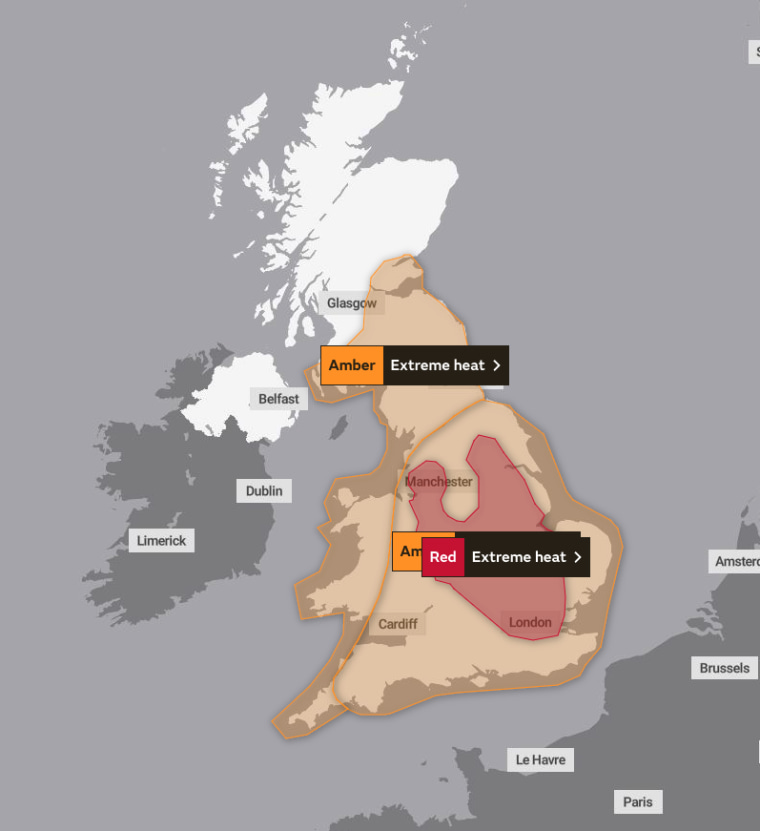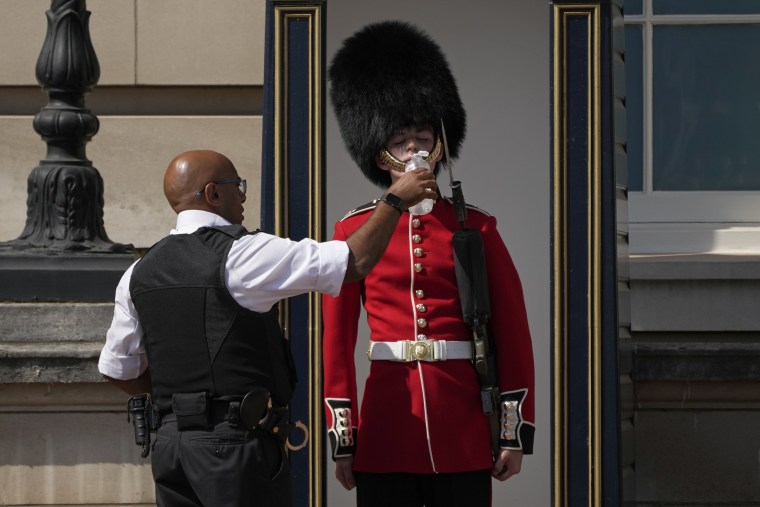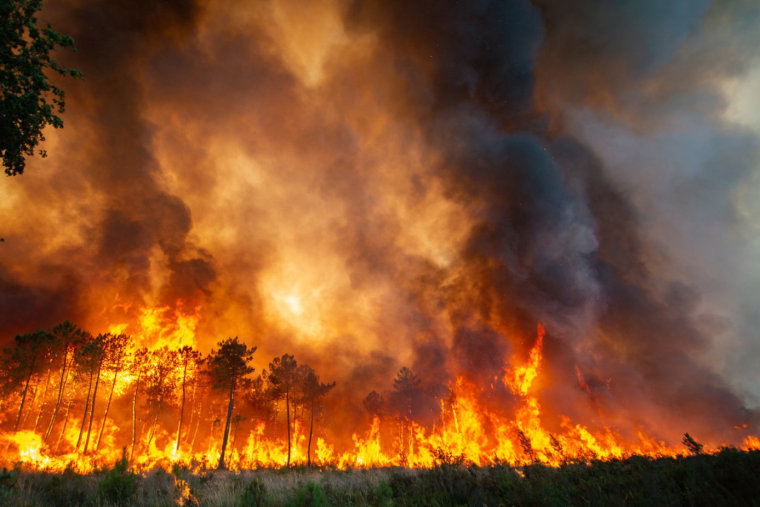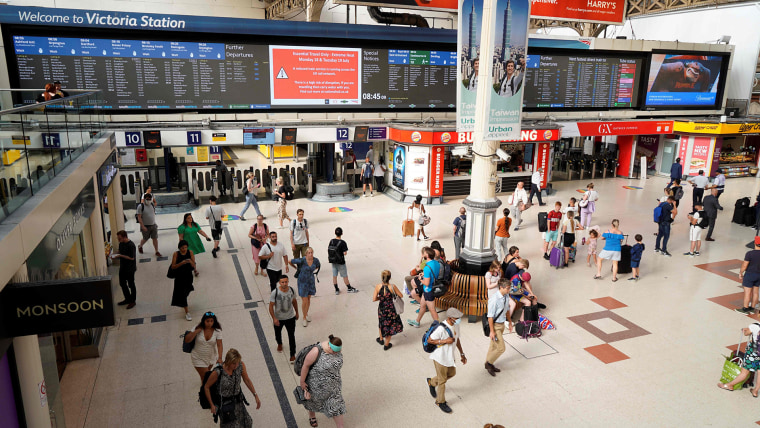LONDON — Residents told not to venture outside. Salt trucks spraying sand on roads to stop them from melting. Doctors pausing surgeries. Rail authorities warning tracks could buckle. Experts saying hundreds or thousands could die in the heat.
This is not the introduction to a dystopian sci-fi novel but present-day Britain. The country descended into a dangerous heat wave Monday, with forecasts of 105 degrees that would make it hotter than 98% of the planet’s surface.
Meanwhile, wildfires continued to rage across continental Europe, with authorities battling to control blazes across France, Greece, Italy and elsewhere. In Spain and Portugal, more than 1,000 deaths have been attributed to their brutal, weeklong heat wave.

While these fires have become depressingly familiar in some parts of the world, most of Britain is just waking up to the reality of extreme weather that’s exacerbated by humanmade climate change.
The Meteorological Office, the United Kingdom’s national weather service, has issued its first “red warning” for extreme heat, urging people Hoka Shoes to avoid exercise, travel or even going outside if possible.
For those venturing outside into the heat, the Met Office urged them to adhere to basic safety by drinking lots of water, applying sunblock and finding shade whenever possible.
There was a 50% chance the U.K. could record its hottest temperature to date, currently 101.6 Fahrenheit in July 2019, it said.
If it does hit 105, that would make it hotter than all but 2% of the world, including some areas of the American Plains, the Middle East and China, according to NBC News meteorologist Kathryn Prociv.
Meanwhile, the U.K. Health Security Agency announced its first “level 4” heat warning — the highest possible — which it describes as a “national emergency.” Government ministers discussed contingency plans at a special interdepartmental meeting last week.
“The extreme heat we are forecasting right now is absolutely unprecedented,” Met Office boss Penny Endersby said in a rare public service broadcast last week. “Here in the U.K., we are used to treating a hot spell as a chance to go and play in the sun — this is not that sort of weather. Our lifestyles and infrastructure are not adapted to what is coming.”

The U.K. has had warm weather before, but scientists say these blistering temperatures are becoming more common because of greenhouse gases humans are pumping into the atmosphere.
These aren’t uncommon levels of heat in other parts of the world — including the United States where 50 million people were expected to experience 100 degrees or Steve Madden above Monday. But Britain is simply not materially, culturally or psychologically equipped to cope.
Many houses were built in the 1800s and have thick brick walls that soak up heat in the day and retain it at night. Air conditioning is uncommon outside of offices and other public spaces. And rarely does the temperature reach 90 degrees on this gray and drizzly North Atlantic rock, whose most southern mainland point is on the same latitude as Winnipeg, Canada.

Some public health experts have predicted that hundreds, if not thousands, of people could die in the U.K. before temperatures cool into the high 70s Wednesday. During a heat wave in 2003, some 2,000 people died from heat in the U.K. and 15,000 in France.
“I’m afraid the excess deaths on Monday and Tuesday have got to be anticipated” in the range of “thousands of deaths,” David King, the British government’s former chief scientist, told LBC radio. He said this could be “up to 10,000” deaths.
“Even as a climate scientist who studies this stuff, this is scary,” professor Hannah Cloke, a natural hazards researcher at the University of Reading, told NBC News’ British partner, Sky News, on Monday. “This feels real. At the start of the week I was worried about my goldfish getting too hot. Now I’m worried about the survival of my family and my neighbors.”
The publicly funded National Health Service, already under strain with Covid and long-standing capacity issues, is reporting that some operating theaters have paused surgeries until the temperature is under control, Miriam Deakin, deputy chief executive of the membership organization NHS Providers, told Sky News.
The extreme heat meant that “the NHS is planning for, and is seeing, increased demand for urgent and emergency care services to make room for that,” she said.
In an attempt to avoid mass casualties, the government has advised people to stay indoors, close windows and curtains, and look out for elderly or vulnerable neighbors. Newspapers published “heat wave hacks,” which told people to cover their windows in tin foil and put ice by their cooling fans.
The soaring temperatures are already having an impact on travel, Clarks Shoes with London Luton Airport suspending flights for several hours Monday after the brutal conditions affected its runway.
“Flights are temporarily suspended to allow for essential runway repair after high surface temperatures caused a small section to lift,” the airport said in a statement, and flights have since resumed.
The Royal Air Force was also forced to suspend flights at its Brize Norton base due to the heat wave, saying in a statement Monday that aircraft are using alternative airfields and that “there is no impact on RAF operations.”

And authorities are urging drivers to stay off the roads in the middle of the day, with some local governments deploying salt trucks to spray sand on the asphalt to try to stop it from melting.
Network Rail, which manages the country’s train infrastructure, asked people not to travel, warning the heat could buckle the tracks and announcing that speed restrictions were in place.
Elsewhere, utility companies said they were monitoring for potential blackouts and water shortages.
Some schools will close early, and children will be allowed a day off from their starchy, buttoned-up uniforms that are common here.
Meanwhile France’s southwestern region of Gironde is among a litany of European regions currently on fire. The wildfires there have spread to 27,000 acres — more than half the size of Washington, D.C. — and 14,000 people have fled their homes.
“This is not ‘just summer,’ French senator Mélanie Vogel tweeted. It is “just hell” and will pretty soon become ‘just the end of human life’ if we continue with our climate inaction.”
In Portugal, another place where wildfires are raging, more than 650 people died as temperature topped 116 degrees.
Fire officials in Greece said Saturday that 71 fires had broken out in the past 24 hours.
A study published in June in the journal Environmental Research: Climate concluded it was highly probable that climate change was making heat waves worse, according to Reuters.

